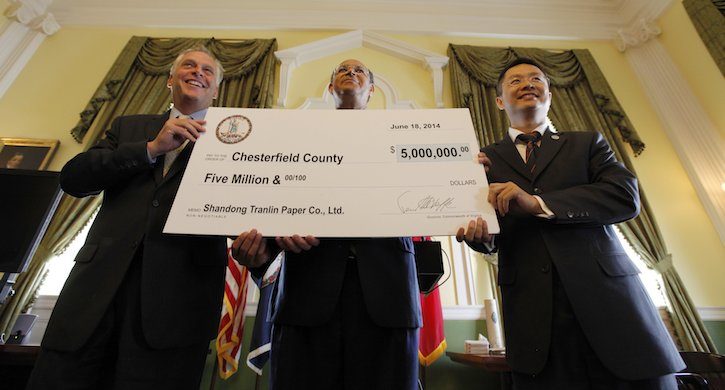
“Radical changes are needed, if suppliers want to break out,” stated a 2010 report on the global paper market. In the years to follow, Shandong-based paper manufacturer Tranlin would do just that, committing to make a $2 billion greenfield investment in Chesterfield County, Virginia, the largest in U.S. history. A new Investment Case Study from the Paulson Institute think tank takes readers behind the negotiations, illustrating several crucial lessons for future Chinese investments in the U.S. Five key takeaways:
- Chinese companies can be technology exporters to Western markets, rather than simply acquirers. By committing to build its next plant in Virginia, Tranlin brought its unique and sustainable papermaking process and IP to the U.S., a notable selling point that bolstered Tranlin’s credibility stateside. “It was still counter-intuitive for many that a Chinese company would be bringing new technology to the United States,” recalled Tranlin’s Jerry Peng, who engineered the Virginia investment.
- Environmental consciousness can spur China’s traditional polluting industries to embrace new business models and access new markets. After committing to an innovative, “circular economy“ process that used straw pulp to make paper, Tranlin was able to capitalize on state financing to reach markets that its competitors had relinquished. In fact, American consumers’ willingness to pay a premium for greener products was one of the factors behind Tranlin’s push to manufacture in the U.S.
- Manufacturing in the U.S. can translate into myriad benefits for Chinese companies. Tranlin’s Virginia investment made economic sense for many reasons, including easy access to raw materials, close proximity to large consumer markets, opportunities for future financing options through an advanced capital market, and the chance to build brand equity and prepare for competition in the global marketplace.
- An open attitude to foreign investment can help American states reboot local economies. After the semiconductor industry dried up in Richmond, Virginia, in 2009, leaving thousands of skilled workers unemployed, former Governor Robert McDonnell and current Governor Terry McAuliffe set out to diversify the state’s economy, eventually attracting Tranlin to a site near Richmond. When completed, Tranlin’s operation in Richmond plans to employ more than 2,000 local skilled workers.
- Local government ties can make or break the U.S.-China deal making process. In the Tranlin deal, connections formed between the local governments in Virginia and Tranlin’s home province of Shandong proved critical to the success of the deal. “Because of the close government interaction they have in China, Tranlin wanted to see equally strongly that our state government and local government supported the project,” said Will Davis, head of the local development authority.


